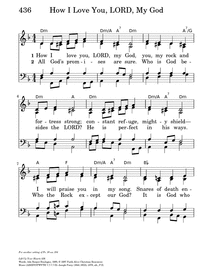The LORD's anointed praises God for delivering him, causing him to triumph over all who opposed his reign.
Scripture References:
st. 1 = vv. 1-6
st. 2 =vv. 7-15
st. 3 =vv. 16-24
st. 4 = vv. 25-28
st. 5 = vv. 29-34
st. 6 = vv. 30-42
st. 7 = vv. 43-48
st. 8 = vv. 46-50
Psalm 18 is also found, with minor variants, in 2 Samuel 22. Faced with a mortal threat from Saul and others who opposed his divinely appointed rule over Israel, David had cried out to God from the depths, and he was marvelously delivered. With majestic imagery David praises God's deliverance from death in answer to prayer (st. 1), God's coming to deliver with creation-shaking power (st. 2), God's heaven-descending reach that lifted David from the overwhelming flood of enemies (st. 3), and God's just ways with humankind by which he saves (st. 4). The LORD has helped and enabled David to triumph over all his foes (st. 5-6) and has extended his reign over hostile nations (st. 7). David's victories in the strength of the LORD have secured his throne for generations (st. 8). Psalm 138 is a similar song of thanksgiving for the LORD's saving acts.
Ada Roeper-Boulogne (b. Haarlem, the Netherlands, 1931) chose to versify this psalm because, she says, "It portrays so well my own struggle with depression and how the LORD lifted me out of the pit and made the whole world light up for me." She first wrote the versification in 1981 in a poem of fifteen stanzas. The Psalter Hymnal. Revision Committee asked her to write the psalm in eight stanzas, which she did in 1985. This versification was first sung on March 16, 1986, in a psalm service at Eastern Avenue Christian Reformed Church, Grand Rapids, Michigan.
Roeper-Boulogne received her elementary education at the Dutch-Chinese Christian School in Central Java, Indonesia (then the Dutch East Indies), where her father, an organist and rebuilder of organs, served as a missionary and teacher. After Japan conquered Indonesia during World War II (1942), Roeper-Boulogne's family was placed in a concentration camp and remained there until 1945. Because a teacher organized a children's choir in the camp, even there Roeper-Boulogne was not totally devoid of music. In 1946 the family returned to the Netherlands and in 1951 immigrated to St. Catharines, Ontario, Canada. Roeper-Boulogne has translated several Dutch songs and is the author of "Little Children Be Happy," which was published in Bible Steps (1983).
Liturgical Use:
Victory celebrations commemorating God's salvation in Christ or triumphs in the Christian life.
--Psalter Hymnal Handbook


 My Starred Hymns
My Starred Hymns







